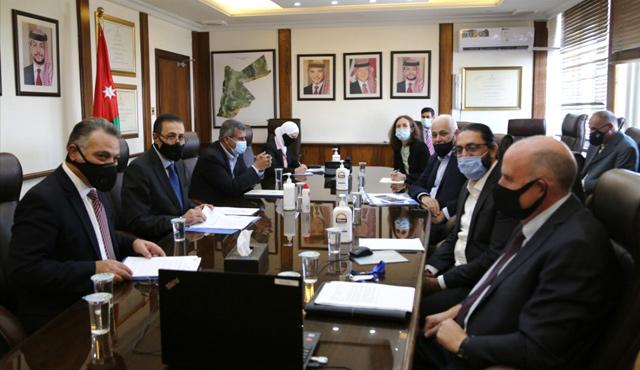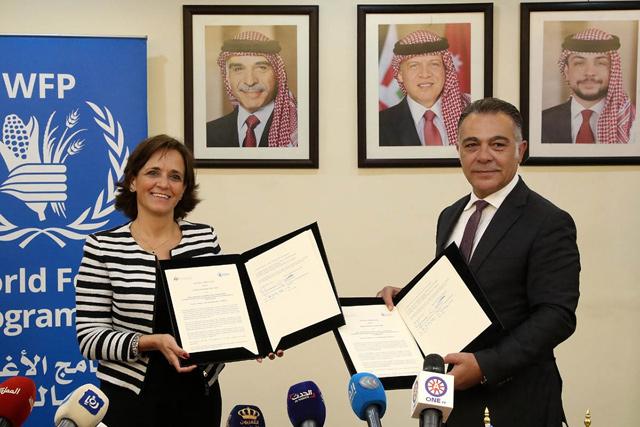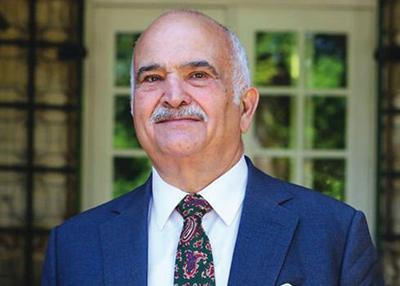You are here
1 million vulnerable Jordanians, refugees to benefit from WFP activities by 2022
By JT - Sep 24,2020 - Last updated at Sep 24,2020

Minister of Planning and International Cooperation Wissam Rabadi and WFP Deputy Country Director Jonathan Campbell attend a meeting on Wednesday (Photo courtesy of Planning Ministry)
AMMAN — One million vulnerable Jordanians and refugees will benefit from the United Nations World Food Programme’s (WFP) activities in Jordan under their three-year strategy endorsed by the government of Jordan as represented by the Ministry of Planning and International Cooperation (MOPIC).
In line with national priorities and the Jordan Response Plan, WFP will support Jordan in its response to existing and future crises, building resilience through social protection and livelihood support for the most vulnerable while contributing to enhanced food security and promoting innovation. The activities have particular emphasis on empowering women, youth, and people with disabilities, according to a Planning Ministry statement.
Commenting on the strategy, Minister of Planning and International Cooperation Wissam Rabadi confirmed Jordan’s belief in the importance in maintaining food security.
He highlighted what was said by His Majesty King Abdullah in his address to the 75th Session of the United Nations General Assembly on Jordan’s readiness to operate as a regional hub for food security.
With a budget of almost JD500 million ($700 million) over three years funded by various international donors, this strategy outlines the support WFP will provide to the government of Jordan in realising the goals of its Vision 2025 and achieve Agenda 2030 as well as in achieving Sustainable Development Goals (SDG) 2 (Zero Hunger) and 17 (Partnerships for the Goals), but also SDG1 (No Poverty), 4 (Quality Education), 5 (Gender Equality), 8 (Decent Work Opportunities) and 13 (Climate Action).
The strategy covers seven different activities, all working to ensure the food security of one million vulnerable people across the Kingdom, through direct assistance, support to education and building the capacity of vulnerable households to earn their own income.
WFP works with around 30 partners to implement the activities, including government ministries, national and international NGOs as well as the communities themselves, the statement.
To facilitate the smooth implementation of the WFP activities and ensure coordination and regular exchange of information with all government partners, a Steering Committee, co-chaired by the Ministry of Planning and International Cooperation and WFP, attended by line ministries, was established to review the strategy and goals of the WFP operations, as well as their implementation.
The first meeting was held on Wednesday, chaired by Rabadi and WFP’s Deputy Country Director Jonathan Campbell in the presence of Education Minister Tayseer Nueimi, Minister of Environment and Acting Minister of Agriculture Saleh Kharabsheh, Minister of Social Development Basma Ishaqat and Secretary General of Ministry of Labour Farouk Al Hadidi.
WFP’s representatives presented updates on the strategic plan, highlighting achievements and major challenges and discussed with the committee future priorities in light of emerging challenges such as COVID-19.
Participants thanked WFP for their work, noting both the contribution to the Jordanian community and the closer linkage with the government under this strategy.
All agreed that in the current circumstances of the pandemic, implementation will be challenging but the activities are relevant and necessary, the statement said.
Related Articles
AMMAN — Minister of Planning and International Cooperation Wissam Rabadi and United Nations World Food Programme (WFP) Country Director and
AMMAN — World Food Programme (WFP) Executive Director David Beasley on Wednesday presented HRH Prince Hassan with a letter of appreciation c
In recognition of its social responsibility, the Landmark Amman Hotel and Conference Centre renewed its partnership agreement with the UN Wo

















